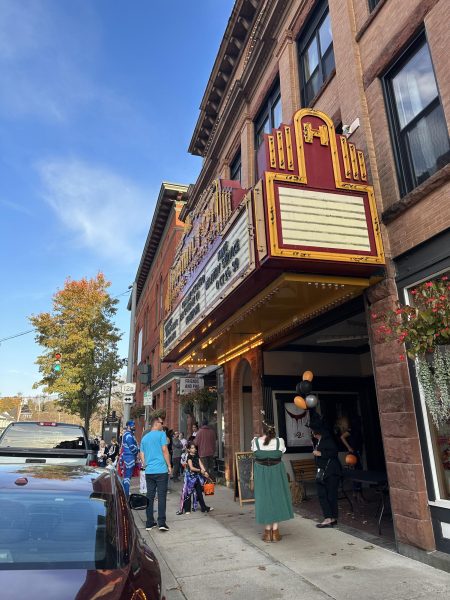Black Solidarity Day Dinner: Students Band Together in Spite of Racist Incidents on Campus
The Black Student Union (BSU) hosted a dinner in the Edge Cafe on Monday, November 4 to commemorate Black Solidarity Day, which was created in 1969 to highlight racial and economic inequality nation-wide. The dinner is an annual event, but this year it was especially significant in the aftermath of the racist whiteboard incident that occurred the week before in the Bryan Complex. The tone and subject of the dinner were shifted in response to those events.
“Tonight we gather both to come together as a community but also to think about how we are each implicated in the community around us. Black solidarity does not assume all people come from similar backgrounds and experiences. It also is not just limited to black people. Rather, this concept asks that we each actively work to see each other for who we are—human beings,” BSU President senior Taylor Dumas said.
Visiting Assistant Professor of History Dionne Bailey spoke at the dinner, opening with remarks regarding the effects of hate, especially in regards to the recent racist incident and how to respond to it.
“Hatred for no reason at all. Targeted because of blatant racism that seems like it is never going to fade. So there we were last week trying to go about our days and nights, working hard loving or liking, maybe even tolerating, an institution that many of you felt ostracized in and also felt like you were on the ice. What this means is that you were of but never in,” Bailey said.
Bailey also shared her own struggles as a black woman in academia being only one of 12 students of color in her undergraduate class. Bailey’s academic specialization in social justice, African-American history and mass incarceration was also relevant to the conversation.
After the opening speech, Bailey opened up the floor for dialogue and answered questions from students. Concerns expressed by students included how to make Colgate a better space, how to be heard as a minority and how to create supportive communities on campus.
“[What] beat me down for so much of my time is that imposter syndrome. Should I Be here? How did I even get here? I’m sure we all had that feeling at some point or another. Thinking that, ‘Oh, she’s just here to teach the black stuff.’ I have to not think that way. I have to know that if these people don’t see my value it’s not for them to see it,” Bailey said in response to a question about knowing your worth even when you are not appreciated.
BSU is not planning any more events in response to the racist incident but continues to hold weekly meetings that are open to all. The meetings offer a space to share feelings and discuss anything the attending group chooses.
“I believe that in order for things like this to not happen again admin needs to make punitive measures against people who are responsible, and if they can not find those people, put in every effort to do so. If admin doesn’t do anything then people will think it’s okay,” Dumas said.
For now students look to each other for support and to hold each other accountable for their actions.






